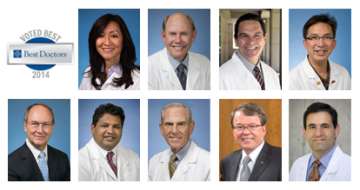Media Highlights 2014

Ranked #5 in the nation
Once again, the UCLA Health System's hospitals in Westwood and Santa Monica have been named to U.S. News and World Report's Best Hospitals 2014-15 Honor Roll. UCLA was ranked No. 5 in the country and No. 1 in both California and the Los Angeles metropolitan area. The annual rankings, now in their 25th year, are the magazine's most exclusive rankings, recognizing hospitals that excel at treating patients who need an especially high level of care. This year's Honor Roll highlights just 17 hospitals out of nearly 5,000 nationwide for their expertise in treating the most challenging patients across a range of medical specialties. UCLA Health System's rankings
Harvoni to treat hepatitis C
Dr. Sammy Saab, professor of medicine in the division of hepatology and of surgery, was interviewed Dec. 4 on Sirius XM's Doctor Radio about the hepatitis C drug Harvoni.
Diet sodamay alter our gut microbes and raise the risk of diabetes
Kirsten Tillisch, associate clinical professor of medicine in the division of digestive diseases, was interviewed for a Sept. 17 NPR segment on how diet sodas may alter gut microbes in a way that increases the risk of metabolic diseases such as Type 2 diabetes.
Jewish Daily Forward focuses on Familial Mediterranean Fever
An Aug. 13 Jewish Daily Forward article covered Familial Mediterranean Fever, a rare hereditary disease that reduces the body's ability to regulate inflammation. Dr. Terri Getzug, clinical professor of medicine in the division of digestive diseases, who is a specialist on the disease, commented on the difficulty in diagnosing the condition and the importance of disease awareness. In addition, she commented about issues patients are having in obtaining a key medication due to cost and availability. Learn more about the UCLA Familial Mediterranean Fever Program
UCLA-led study identifies genetic factors involved in pediatric ulcerative colitis
UCLA researchers were part of a team that has discovered the interplay of several genetic factors that may be involved in the development of early-onset ulcerative colitis, a severe type of inflammatory disease. Full press release
Nine UCLA Digestive Disease physicians voted Best Doctors in America for 2014
Best Doctors conducts an exhaustive, peer-reviewed survey of the medical profession, polling more than 50,000 doctors across the country. Doctors are asked to provide an assessment of the clinical abilities of their peers within each of the more than 400 subspecialties of medicine. The millions of individual data points collected through this process, after being compiled through algorithms that correct for statistical bias, yields the list of those physicians deemed "best" by their peers. Continuous peer-to-peer surveys help identify specialists who are considered by fellow physicians to be the most skilled in their fields and most qualified for reviewing and treating complex medical conditions.
Best Doctors objective is to identify the best trained, most experienced and most skilled specialists, regardless of where they practice. Only 5% of the doctors in any country are actually selected to become Best Doctors. Best Doctors has earned a worldwide reputation for reliable, impartial results by remaining totally independent. Doctors are not paid to complete the survey, and cannot pay to be included in the database.

Top: Left-Right: Lin Chang, MD, Jeffrey L. Conklin, MD, Francisco Durazo, MD, Steven-Huy Han, MD. Bottom: Left-Right: Dennis M. Jensen, MD, V. Raman Muthusamy, Bennett E. Roth, MD, Bruce A. Runyon, MD and Sammy Saab, MD, MPH
My GI Health: Reimagining the dialogue between patients and physicians
Dr. Brennan Spiegel, associate professor of medicine in the division of digestive diseases, was mentioned May 30 in an article by Medical Marketing & Media on My GI Health.
$4 million gift from The Eli and Edythe Broad Foundation benefits research in stem cell science and digestive diseases
Yahoo! News, Westside Today, News-Medical, Century City/Westwood Patch, Examiner, Digital Journal, Stem Cell News, City News Service, WN News.com, Health Medicine Network, Pluripotent: Stem Cell News, and websites for FOX-TV (Greenville, N.C.),WVNS-TV (Ghent, Va.), WAND-TV (Decatur, Ill.), KWTV-TV (Oklahoma City, Okla.), WGFL-TV (Gainesville, Fla.), WFSB-TV (Hartford, Conn.), KVVU-TV (Las Vegas, Nev.), WFLX-TV (West Palm Beach, Fla.), KFDA-TV (Amarillo, Texas), KQCW-TV (Tulsa, Okla.), WAVE-TV (Louisville, Ky.) and others May 8, Bioresearch Online May 13 and Canyon News May 15 covered two gifts from The Eli and Edythe Broad Foundation to UCLA totaling $4 million that will fund UCLA research. The gifts will benefit the Eli and Edythe Broad Center of Regenerative Medicine and Stem Cell Research at UCLA and the Center for Inflammatory Bowel Diseases at UCLA's Division of Digestive Diseases. Dr. Owen Witte, director of the Broad Stem Cell Research Center and Dr. Gary Gitnick, professor and co-chief of the Division of Digestive Diseases, and the Fran and Ray Stark Foundation Chair at the David Geffen School of Medicine at UCLA, were quoted.
Documentary highlights gut-brain interactions
Arte, a TV network in Europe, aired a documentary in January and March on the relationship between the gut and brain that featured UCLA research showing that ingesting probiotic bacteria can affect brain function in humans. Dr. Kirsten Tillisch, associate professor of medicine in the division of digestive diseases at the David Geffen School of Medicine at UCLA, who directs the neuroimaging core of the G. Oppenheimer Center for Neurobiology of Stress and Resilience at UCLA, was interviewed.
Super Bowl party addresses education
A Feb. 2 Los Angeles Daily News story featured an annual Super Bowl party given by Dr. Gary Gitnick, chief of the division of digestive diseases, professor of medicine and founder of the Fulfillment Fund, a non-profit organization that helps under-served students access college through mentoring, counseling, motivational in-school curriculum and other support programs. The event was attended by a number of Los Angeles education and political leaders, including Mayor Eric Garcetti and United Teachers of Los Angeles President Warren Fletcher. A town hall panel was held during half-time to discuss key education issues.